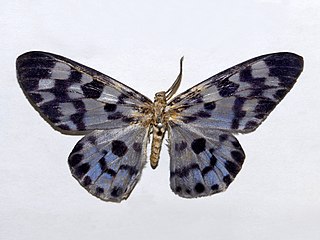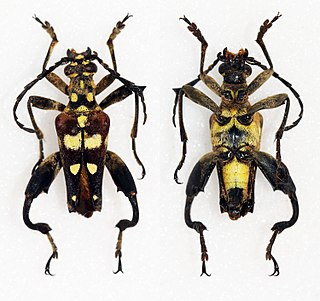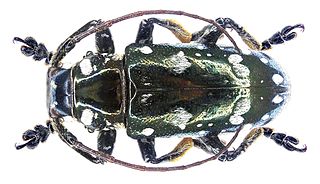
Castianeira is a genus of ant-like corinnid sac spiders first described by Eugen von Keyserling in 1879. They are found in Eurasia, Africa, and the Americas, but are absent from Australia. Twenty-six species are native to North America, and at least twice as many are native to Mexico and Central America.

Saturnia is a genus of large silkmoths in the family Saturniidae, which the German biologist Franz von Paula Schrank first described in 1802. Its members are commonly named emperor moths, though this is also used for various close relatives in subfamily Saturniinae. Most species are Palearctic, but three, commonly called "saturnia moths", inhabit the chaparral of California: S. mendocino, S. walterorum, and S. albofasciata.

The pygora beetles or flower beetles are scarab beetles of the genus Pygora. They are native to Madagascar.

Agrius is a genus of moths in the family Sphingidae. The genus was erected by Jacob Hübner in 1819.

Phragmatobia is a genus of moths in the subfamily Arctiinae described by James Francis Stephens in 1828. Many tiger-moth species of small and medium size were described within this genus. However, only a few are related to the type species.

Longicella is a genus of moths of the family Noctuidae. The genus was erected by Karl Jordan in 1896.

Agrius luctifera is a moth in the family Sphingidae. It is found in Indonesia and New Guinea.

Agrius rothschildi is a moth of the family Sphingidae. It is known from New Caledonia. Agrius rothschildi is a replacement name for Sphinx fasciatus.

Epicauta is a genus of beetles in the blister beetle family, Meloidae. The genus was first scientifically described in 1834 by Pierre François Marie Auguste Dejean. Epicauta is distributed nearly worldwide, with species native to all continents except Australia and Antarctica. Surveys have found the genus to be particularly diverse in northern Arizona in the United States. Few species occur in the Arctic, with none farther north than the southern Northwest Territory of Canada.

Pherbellia is a genus of flies in the family Sciomyzidae, the marsh flies or snail-killing flies. They occur throughout the world, except for the Subantarctic region.

Sternocera orissa, the giant jewel beetle, is a species of beetles belonging to the Buprestidae family.

Sagridola is a genus of beetles in the family Cerambycidae, containing the following species:
Sagridola luctifera is a species of beetle in the family Cerambycidae. It was described by Fairmaire in 1893.

Pteropliini is a tribe of longhorn beetles of the subfamily Lamiinae.
Megachile luctifera is a species of bee in the family Megachilidae. It was described by Spinola in 1841.

Xiphotheata is a genus of longhorn beetles of the subfamily Lamiinae, containing the following species:

Tragocephala jucunda is a species of beetle in the family Cerambycidae. It was described by Gory in 1835, originally under the genus Lamia. It is known from South Africa and Madagascar.

Thevenetimyia luctifera is a species of bee flies, insects in the family Bombyliidae.

Thevenetimyia is a genus of bee flies in the family Bombyliidae. There are more than 40 described species in Thevenetimyia found worldwide, mostly in North America with several species in Australia and southeast Asia.
Archistratiomys is a genus of flies in the family Stratiomyidae.















